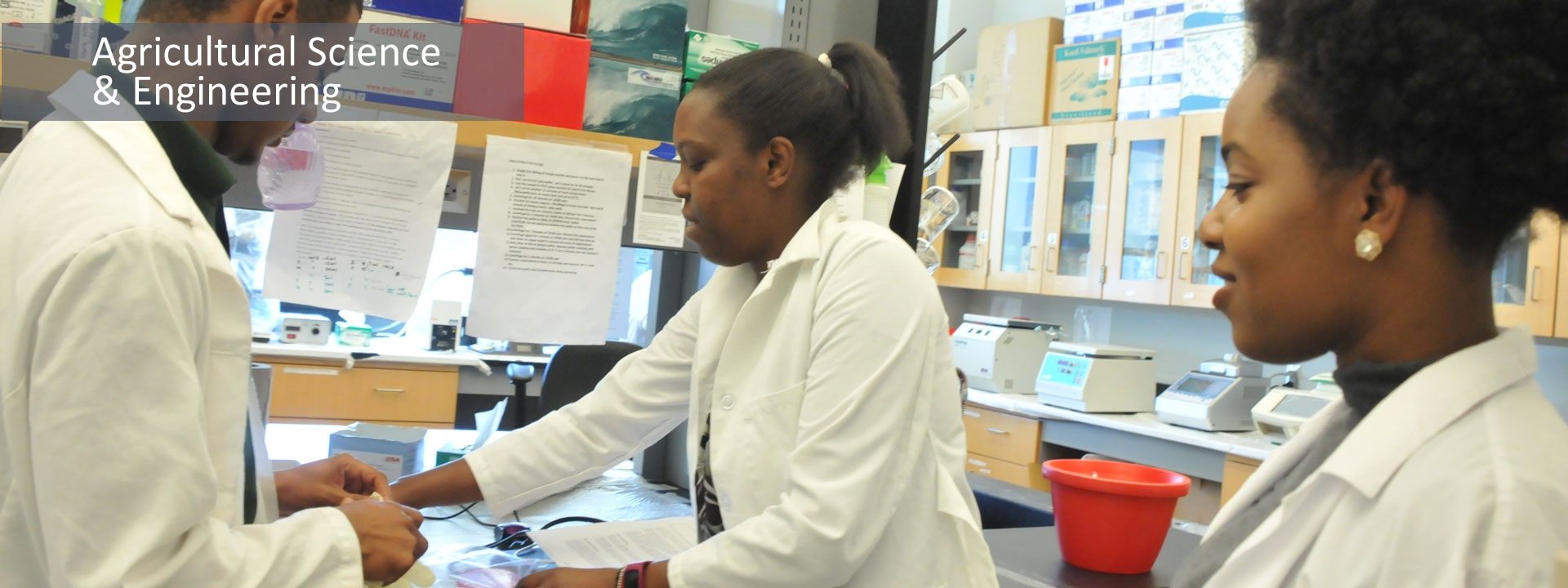- Home >
- Agricultural Programs >
- Degree Programs
- > M.S. in FOOD AND ANIMAL SCIENCES
Food and Animal Sciences
Master's Level Program

The Master of Science in Food and Animal Sciences degree is offered with two options, thesis or non-thesis. The thesis option requires a minimum of twenty-six (26) credit hours of course work and a thesis of four (4) credit hours. The candidate for the degree must complete eighteen (18) credit hours of core courses: AGSC 5060, AGSC 5110, AGSC 5120, AGSC 5440, AGSC 5610, AGSC 5620 and twelve (12) credit hours maximum of electives. The non-thesis option requires a minimum of thirty-five (35) credit hours of course work. The candidate for the degree must complete seventeen (17) credit hours of core courses: AGSC 5060, AGSC 5110, AGSC 5350, AGSC 5440, AGSC 5610, AGSC 5620; and eighteen (18) credit hours maximum of electives. These courses must be approved by the advisor and department head.
Applicants must have the equivalent of a bachelor’s degree with a major in one of the Agricultural Sciences or related areas, a minimum quality grade point average of 2.50 on a 4.00 point scale, and a minimum score of 290 on the GRE (verbal and quantitative) or 370 on the MAT for unconditional admission. Higher GPA from the accredited colleges and universities or GRE scores may be used to compensate for some minor deficiencies in admission requirements.
Curriculum/Program of Study for MS Degree in Food and Animal Sciences |
|
| Core Courses : Thesis option 18 credit hours or non-thesis option 17 credit hours | |
| AGSC 5060 – Statistics for Research | 3 Credits |
| AGSC 5110 – Research Methods | 3 Credits |
| AGSC 5120 – Thesis Writing | 4 Credits |
| OR | |
| AGSC 5350 – Independent Study of Contemporary Issues & Problems (For non-thesis option) | 3 Credits |
| AGSC 5150 – Livestock Production and Management | 3 Credits |
| AGSC 5540 – Food Policies and Regulation | 3 Credits |
| AGSC 5610 and 5620 – Graduate Seminar in Agricultural Sciences I, II | 1, 1 Credit |
| Elective Courses: 12 credit hours minimum with thesis or 18 credit hours minimum for non-thesis | |
| AGSC 5130 – Advanced Animal Nutrition | 3 Credits |
| AGSC 5140 – Contemporary Issues in Animal Science | 3 Credits |
| AGSC 5160 – Animal Genetics and Breeding | 3 Credits |
| AGSC 5170 – Advanced Poultry Production and Management | 3 Credits |
| AGSC 5280 – Advanced Poultry Nutrition and Biotechnology | 3 Credits |
| AGSC 5340 – Cell & Tissue Culture | 3 Credits |
| AGSC 5470 – Immunochemistry in Biotechnology | 3 Credits |
| AGSC 5440 – Animal Reproductive Physiology | 3 Credits |
| AGSC 5520 – Advanced Food Processing and Engineering | 3 Credits |
| AGSC 5550 – Food Safety and Sanitation | 3 Credits |
| AGSC 5560 – Food Product Development & Sensory Science | 3 Credits |
| AGSC 5590 – Advanced Technologies in Detection and Food Analysis | 3 Credits |
| AGSC 6010 – Gene Structure & Function | 3 Credits |
PDF version here.
Each student must pass Research Methods (AGSC 5110) and Statistics for Research (AGSC 5060), must have a thesis advising committee appointed, and must be advanced to candidacy before enrolling in Thesis Writing (AGSC 5120).
The candidate must submit a thesis on a topic approved by the major advisor. Upon completion of the thesis, the candidate must satisfactorily pass an oral examination conducted by the Thesis Examination Committee. Students choosing thesis option will require 30 hours of course work which will include four (4) credit hours of thesis research.
This option is for students who would like to focus on training in specialized areas to meet the needs of employers in food and animal health related industries, specialized field such as food engineering, food safety and quality, product development and sensor sciences, agricultural product processing, marketing organizations, teaching, agricultural extension services, and various state and federal government agencies. This program is not recommended for students who have any aspirations toward pursuing a Ph.D. degree.
Students choosing the non-thesis option will be required to take a minimum of 35 hours of course work which will include AGSC 5350 – Independent Study of Contemporary Issues and Problems. The graduate student with guidance from his or her major advisor will identify contemporary issues and problems in food and animal sciences, conduct comprehensive literature review, write a report in a format of a review paper and make an oral presentation to his or her advisory committee.
For more information, contact the Graduate Coordinator, Dr. Bharat Pokharel, (615) 963-6054.


